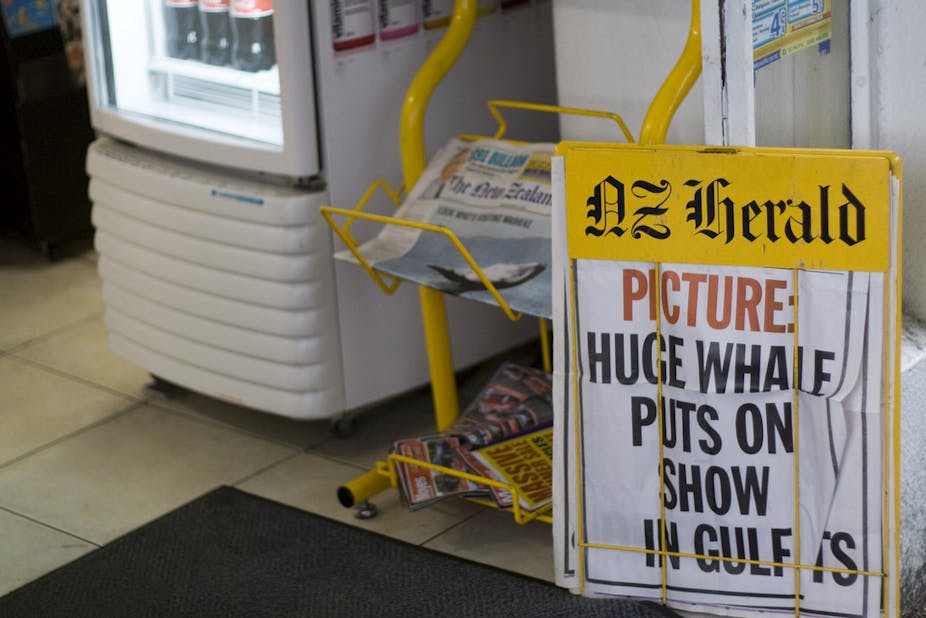APN News & Media is mulling a float of its New Zealand media assets including its masthead The NZ Herald, The Radio Network (TRN) and group buying site GrabOne. The company is potentially selling 60% of its New Zealand operations maintaining a minority stake in the company. If the float goes ahead, the dual-listed APN would more or less be an Australian media company as most of its assets would be in Australia, not New Zealand.
Why now? The company just raised A$132 million to buy full control of its Australian Radio Network (ARN) and TRN.
APN has made it very clear radio is a key strategic asset for the company. APN CEO Michael Miller said in the company’s half-year results statement that “radio continues to grow as a medium in both countries,” claiming the success of the networks was proof the management team had made the right decision to back radio as a segment.
In the first half of the year, the combined revenue of ARN and TRN was A$138 million, representing 34% of APN’s total revenue. At the same time income from APN’s Australian and New Zealand publishing was A$234.6 million representing 57.7% of its total revenue.
Why not just separate the print and broadcasting assets, given print newspapers are in decline and radio still seems to offer income growth. This is exactly what American media corporation Gannet did in August. Gannet followed News Corporation, Tribune and Time Warner in splitting its publishing and broadcasting and digital businesses into two publicly traded companies.
One logic behind the float naturally is that it is cheaper for any company to fund their operations in equity markets rather than with debt as the company can always decide not to pay any dividends.
What will Fairfax do?
Miller has pointed out that floating APN’s New Zealand assets is “just a consideration”, and the company is open to other options, such as a trade sale.
In a trans-Tasman context it’s difficult to guess who would buy print newspaper assets. Investors certainly seem to have more appetite for broadcasting businesses. The value of a possible APN float could depend on the income derived from the NZ Herald paywall, according to one fund manager. But a paywall is hardly likely to boost the NZ Herald revenues as Fairfax’s paywalls are contributing only about 2% of the company’s total revenue.
APN is planning to implement a paywall for the NZ Herald in the second half of this year, but it seems oddly reluctant to do so. Fairfax is not charging for its digital content in New Zealand either, so it seems the two companies are playing ‘wait and see’ in this regard. It seems likely that the nzherald.co.nz will launch its paywall prior to its possible float.
If APN puts its New Zealand assets up for sale, it is hard to see Fairfax getting interested in buying APN’s print assets, even though Fairfax lacks exposure to Auckland and the North Island newspaper market. Fairfax owns the leading newspapers in Christchurch and Wellington, while APN’s NZ Herald controls the Auckland newspaper market. It’s also questionable whether the company would be allowed to buy APN’s assets as New Zealand media ownership is already heavily concentrated, as the JMAD New Zealand ownership report shows. APN and Fairfax dominate the newspaper markets with more than 80% combined market share.
However, the two companies are getting cosier in New Zealand. In July the companies signed a printing agreement meaning several Fairfax newspapers are being printed in APN’s Auckland facility. The agreement is of course a practical cost saving exercise, but it is an interesting example of closer cooperation.
There is another consideration. Fund manager Allan Gray holds 12.8% of APN’s shares and it has a 5.7% stake in Fairfax Media. At the moment it seems the fund manager is backing APN’s listing plans in New Zealand. However its stance could change very quickly. One should never underestimate the power of financial owners on media companies and their direction. As Hope and Myllylahti observe, “players such as private equity and venture capital firms have become increasingly involved in media corporations, largely because of lucrative restructuring opportunities”.
No room for two floats
New Zealand media corporate MediaWorks recently appointed Mark Weldon, the former CEO of New Zealand stock market operator NZX, as its new head. MediaWorks owns and operates commercial TV channels and controls half of the country’s commercial radio market.
Media has speculated that because of Weldon’s background in capital markets, MediaWorks will be soon floated, split or sold. I doubt that the New Zealand stock market would have room for two media companies. It is more likely MedaWorks will be sold or split. According to Stuff, the company was negotiating earlier on this year with Seven West Media about sale, but the deal was never sealed because the two parties couldn’t agree on price.

